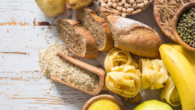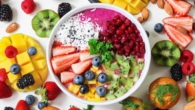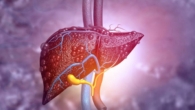
9 foods to improve memory
0
List of products rich in B vitamins, iron and zinc.
1. Olive oil
Scientists from the American Temple University have confirmed that olive oil supports memory and learning abilities, and also prevents the formation of vascular plaques. This is because it contains polyphenols – important antioxidants that slow down the aging process of the brain. The longer the cells remain young, the longer they will be able to work at full strength. This means that memory will function effectively. In addition, polyphenols improve metabolism and intestinal microflora.
For maximum benefit, it is best to add raw oil as a salad dressing: two teaspoons per day is enough. But frying will not help – when heated, carcinogens begin to be released, and the oil completely loses its useful properties.
2. Egg
Eggs are rich in choline, an important substance that helps form new cells and has a positive effect on nerve endings. The better nerve impulses pass through the brain, the more efficiently our memory will work. When neurons are well connected to each other, information is absorbed faster. One large egg contains 20% of the daily requirement of choline – 113 milligrams.
Eggs are also rich in vitamins B6, B9, B12 and D. B vitamins reduce the level of homocysteine, a hormone that can “attack” the walls of blood vessels and form blood clots. Vitamins B and D help with protein absorption and have a positive effect on brain cells, stimulating their reproduction. In addition, egg protein is considered the most digestible among animal proteins. Thus, the more eggs we eat, the more “building material” the brain receives, and cognitive abilities improve. Doctors recommend eating 2 to 6 eggs per week. 3. Pumpkin seeds Rich in zinc, seeds help the brain better perceive and assimilate information. The product will provide the body with magnesium, tryptophan, selenium, vitamins B1 and K, which contribute to concentration, long-term retention of information in memory, and reduce stress levels.
Magnesium, which is part of the seeds, has a positive effect on the nervous system, including the nerve endings in our head. To get the most nutrients, you need to eat from 50 to 100 grams of seeds per day.
4. Beetroot juice
Scientists from Wake Forest University have found that beetroot juice improves blood and oxygen flow to the brain, making it work more efficiently. This juice contains antioxidants that remove toxic substances from the body.
To improve memory, doctors recommend drinking up to two glasses of juice a day.
5. Broccoli
Broccoli, like eggs, contains a large amount of choline and vitamin K. Thanks to them, the perception of verbal information and episodic memory, which records events in all their details, improves. Broccoli also contains glucosinolate, which prevents the breakdown of acetylcholine – organic compounds that transmit nerve impulses. Thus, broccoli optimizes the functioning of the nervous system and has a positive effect on brain function. The vegetable can be eaten every day.
By the way, broccoli is rich in vitamin C – even more than in citrus fruits, and saturation occurs faster due to its high fiber content.
Vegetables should be cooked immediately after purchase – or frozen to preserve more vitamins and benefits. With prolonged storage without refrigeration, beneficial substances will be lost.
6. Turmeric
One of the most affordable spices that has been used in Asian culture for centuries. Turmeric contains the element curcumin, which improves blood circulation and oxygen supply to the brain, and is also able to destroy the notorious vascular plaques. As a bonus, curcumin has an anti-inflammatory effect.
Another useful property of turmeric is that it is an immunomodulator that destroys peptides that provoke the development of Alzheimer's disease.
You should consume no more than a tablespoon of the spice per day.
7. Black beans
Black beans contain B vitamins and microelements important for memory: folate, magnesium, potassium, iron and calcium. Together, they renew brain cells and prevent their aging.
One of the main elements of black beans is manganese, which is necessary for the synthesis of the already familiar acetylcholine.
Doctors recommend not to get carried away with beans if you have gastritis, pancreatitis and gout. There is no consumption norm for healthy people, but it is worth remembering about the high calorie content of the product – 341 kilocalories per 100 grams.
8. Spinach
Spinach contains vitamins K, A, C and the pigments lutein and zeaxanthin. Vitamin K is considered the best for memory, as it participates in the synthesis of fats, which are important for the construction and functioning of cells. Vitamins A and C help the brain function better, fight inflammation and are good for immunity.
Lutein and zeaxanthin play an important role in good vision, and therefore visual memory. And if zeaxanthin is already contained in the retina of the eye, then lutein can only come to us from the outside, together with food of plant origin.
Spinach contains the largest amount of lutein among edible plants. It is best to use the vegetable in salads – fresh it retains a maximum of its properties – and crumble the daily norm there – about 100-150 grams of the product.
9. Walnut
In addition, nuts help lower blood pressure and protect arteries, having a beneficial effect on the heart and brain. You can eat 20 to 30 grams a day without harming your figure.









Leave a Reply